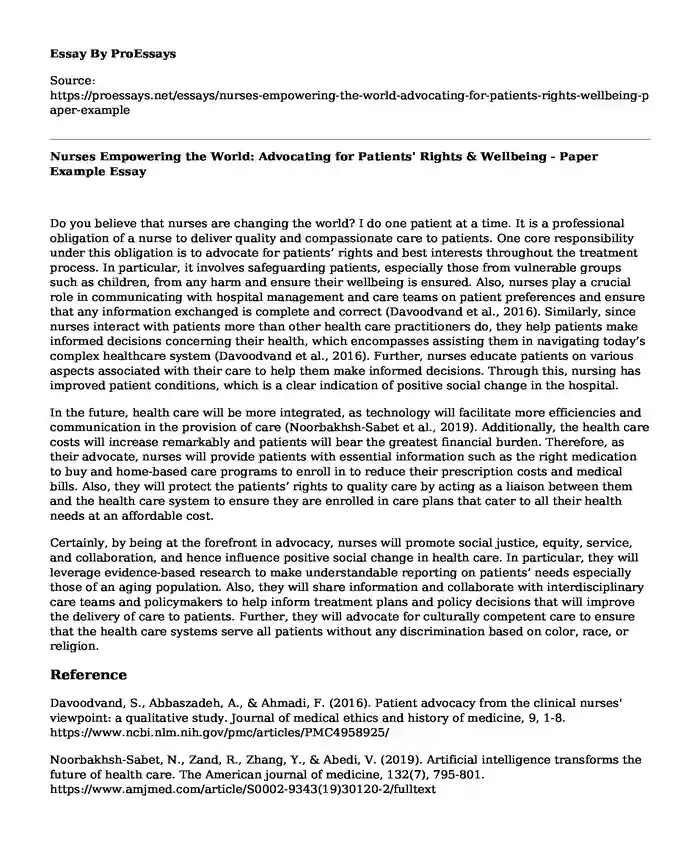Do you believe that nurses are changing the world? I do one patient at a time. It is a professional obligation of a nurse to deliver quality and compassionate care to patients. One core responsibility under this obligation is to advocate for patients’ rights and best interests throughout the treatment process. In particular, it involves safeguarding patients, especially those from vulnerable groups such as children, from any harm and ensure their wellbeing is ensured. Also, nurses play a crucial role in communicating with hospital management and care teams on patient preferences and ensure that any information exchanged is complete and correct (Davoodvand et al., 2016). Similarly, since nurses interact with patients more than other health care practitioners do, they help patients make informed decisions concerning their health, which encompasses assisting them in navigating today’s complex healthcare system (Davoodvand et al., 2016). Further, nurses educate patients on various aspects associated with their care to help them make informed decisions. Through this, nursing has improved patient conditions, which is a clear indication of positive social change in the hospital.
In the future, health care will be more integrated, as technology will facilitate more efficiencies and communication in the provision of care (Noorbakhsh-Sabet et al., 2019). Additionally, the health care costs will increase remarkably and patients will bear the greatest financial burden. Therefore, as their advocate, nurses will provide patients with essential information such as the right medication to buy and home-based care programs to enroll in to reduce their prescription costs and medical bills. Also, they will protect the patients’ rights to quality care by acting as a liaison between them and the health care system to ensure they are enrolled in care plans that cater to all their health needs at an affordable cost.
Certainly, by being at the forefront in advocacy, nurses will promote social justice, equity, service, and collaboration, and hence influence positive social change in health care. In particular, they will leverage evidence-based research to make understandable reporting on patients’ needs especially those of an aging population. Also, they will share information and collaborate with interdisciplinary care teams and policymakers to help inform treatment plans and policy decisions that will improve the delivery of care to patients. Further, they will advocate for culturally competent care to ensure that the health care systems serve all patients without any discrimination based on color, race, or religion.
Reference
Davoodvand, S., Abbaszadeh, A., & Ahmadi, F. (2016). Patient advocacy from the clinical nurses' viewpoint: a qualitative study. Journal of medical ethics and history of medicine, 9, 1-8. https://www.ncbi.nlm.nih.gov/pmc/articles/PMC4958925/
Noorbakhsh-Sabet, N., Zand, R., Zhang, Y., & Abedi, V. (2019). Artificial intelligence transforms the future of health care. The American journal of medicine, 132(7), 795-801. https://www.amjmed.com/article/S0002-9343(19)30120-2/fulltext
Cite this page
Nurses Empowering the World: Advocating for Patients' Rights & Wellbeing - Paper Example. (2023, Oct 29). Retrieved from https://proessays.net/essays/nurses-empowering-the-world-advocating-for-patients-rights-wellbeing-paper-example
If you are the original author of this essay and no longer wish to have it published on the ProEssays website, please click below to request its removal:
- Paper Example on History and Evolution of Social Welfare Policy
- Need for the End of Life Care Essay Example
- CNO Standards in Nursing - Essay Sample
- U.S. Marijuana Use: Federal vs. State Laws - Research Paper
- Essay Example on Top Girls & A Raisin in the Sun: Women's Place in Society
- Essay Example on John Stuart: Mastermind Behind Utilitarianism for a Better Society
- Essay Sample on Modern Healthcare: CEOs Facing Strict Measures to Meet Medical Demands







